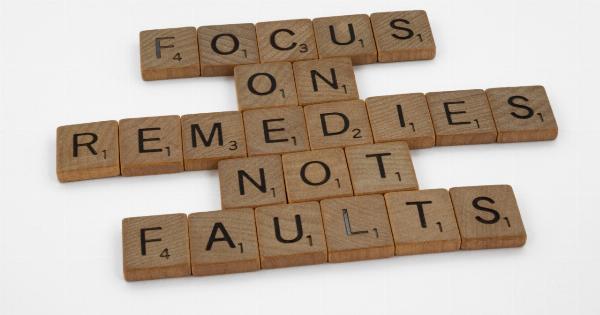Greed is an intense desire for wealth, power, or material possessions. It is a human trait that can be found in people of all social classes, professions, and ages. Greed is not always easy to recognize, and it can be a challenging habit to break.
Here are 30 ways to overcome greed:.
1. Acknowledge Your Greed
The first step in overcoming greed is to admit that you have a problem. Only by acknowledging and accepting your greed can you begin to take steps to address it.
2. Practice Gratitude
Focusing on the good things in your life can help you appreciate what you have and reduce your desire for more. Cultivate gratitude by keeping a gratitude journal, saying thank you more often, and expressing your appreciation to others.
3. Set Financial Goals
Setting financial goals can help you keep your spending in check and focus on what is truly important. Create a budget and savings plan, and track your progress to stay motivated.
4. Be Content with What You Have
Many of us have more than we need, but we still want more. Focus on being content with what you have, rather than always wanting more. Practicing contentment can help you overcome the desire for more material possessions.
5. Help Others
Serving others can help you put your own desires in perspective and develop a sense of empathy. Find ways to volunteer your time, donate to charity, or help a friend or family member in need.
6. Learn to Share
Sharing what you have can be a powerful antidote to greed. Make a habit of sharing your time, possessions, and resources with others. Generosity can help you overcome the desire to always have more.
7. Invest in Experiences
Instead of focusing solely on material possessions, invest in experiences that will bring you joy and fulfillment. Travel, learn a new skill, or try a new hobby – these experiences can be more valuable than any material possession.
8. Limit Your Exposure to Advertising
Advertising is designed to make you want more – whether you need it or not. Limit your exposure to advertising to reduce your desire for more material possessions.
9. Set Limits on Your Purchases
Setting limits on your purchases can help you stay within your budget and avoid overspending. Before making a purchase, ask yourself if you really need the item and if it is within your budget.
10. Find Things to Be Passionate About
Developing passions and hobbies can help you find fulfillment that is not tied to material possessions. Pursue the things that bring you joy and fulfillment.
11. Be Mindful of Your Consumption
Be mindful of what you consume – whether it is food, material possessions, or media. Focus on consuming what is meaningful and necessary, rather than seeking out the latest trend or fad.
12. Practice Self-Reflection
Regularly taking time to reflect on your motivations and desires can help you become more self-aware and mindful. Ask yourself why you want something or feel the desire to acquire more.
13. Cultivate Compassion
Cultivating compassion for others can help you overcome your own desires and develop a sense of empathy. Practice compassion by empathizing with others and acting with kindness and generosity.
14. Spend Time in Nature
Spend time in nature to help you focus on the beauty and simplicity of the world around you. Nature can help you find peace and perspective in a world that can be dominated by material possessions.
15. Take Inventory of Your Possessions
Taking inventory of your possessions can help you see how much you truly have. It can also help you identify the possessions that are truly meaningful and worth keeping.
16. Avoid Comparing Yourself to Others
Comparing yourself to others can lead to feelings of envy and a desire for more possessions. Avoid comparing yourself to others, and focus instead on your own personal goals and achievements.
17. Find Contentment in Simple Pleasures
Find contentment in simple pleasures like spending time with loved ones, enjoying a favorite hobby, or experiencing a beautiful sunset. These simple pleasures can help you appreciate what is truly important in life.
18. Practice Mindfulness
Practice mindfulness by being fully present in the moment and aware of your thoughts and feelings. Learning to be more present can help you appreciate what you have and overcome the desire for more.
19. Give Back to Your Community
Volunteering or giving back to your community can help you feel more connected and invested in the well-being of others. It can also help you overcome feelings of selfishness and greed.
20. Practice Acceptance
Practice acceptance by accepting yourself and others for who they are. Learn to be satisfied with what you have, rather than always seeking more or trying to change what you cannot control.
21. Find Joy in the Present Moment
Find joy in the present moment by being fully present and engaged in what you are doing. Enjoy the small pleasures of life, like a good cup of coffee or a beautiful view.
22. Develop a Giving Mindset
Develop a giving mindset by focusing on how you can help and support others. Rather than always thinking about what you can get, think about what you can give.
23. Use Your Resources Wisely
Using your resources wisely can help you overcome greed and develop a sense of responsibility. Use your resources – whether they are financial, material, or emotional – to help others and make the world a better place.
24. Focus on Relationships
Focus on building strong relationships with family and friends. These relationships can provide meaning and fulfillment in a way that material possessions cannot.
25. Seek Professional Help
If your greed is impacting your life and relationships, seek professional help. A therapist or counselor can help you develop strategies to overcome your greed and develop healthier habits.
26. Surround Yourself with Positive Influences
Surround yourself with positive influences – whether it is friends, family, or a supportive community. These positive influences can help you stay motivated and focused on what is important.
27. Find Meaning in Your Work
Find meaning in your work by focusing on how you can make a positive impact in your workplace or community. Developing a sense of purpose can help you overcome feelings of emptiness or dissatisfaction.
28. Practice Self-Care
Practicing self-care – whether it is getting enough sleep, eating healthy food, or taking time for yourself – can help you feel calmer and less anxious.
This can help you develop a more balanced approach to life and reduce the desire for material possessions.
29. Develop an Attitude of Gratitude
Develop an attitude of gratitude by focusing on what you are grateful for, rather than what you lack. Cultivate gratitude by expressing your appreciation to others and celebrating your own accomplishments.
30. Remember What Is Truly Important
Finally, remember what is truly important in life: relationships, experiences, and personal fulfillment. These things cannot be bought with money or possessions, but they are the things that make life truly worth living.




























